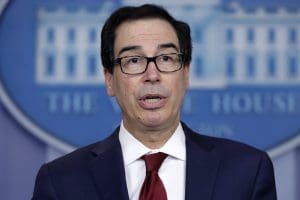Mnuchin still insists GOP tax cuts will pay for themselves. The math says otherwise.
‘Mnuchin is either somehow ignorant of mountains of evidence on this front, or he’s being intentionally misleading,’ said Josh Bivens, research director at the Economic Policy Institute.

Trump administration officials continue to make wildly inaccurate statements about the economic impact of the Republican 2017 tax law. On Wednesday, contrary to all available evidence, Treasury Secretary Steve Mnuchin told the Senate Finance Committee that he stands by previous administration claims that the tax cuts “will pay for themselves.”
“This will be simple math,” Mnuchin testified under oath. “We measure this over 10 years. We got eight years left. I look forward to writing the committee a letter in eight years going through all the exact numbers.”
Mnuchin’s claim, flagged by American Bridge, a progressive opposition research organization, is widely disputed by experts, even experts who tout the benefits of the 2017 law.
“Secretary Mnuchin’s statement is clearly false,” Josh Bivens, research director at the Economic Policy Institute, said in an email. “No reputable economist thinks that the 2017 tax cuts will pay for themselves. Mnuchin is either somehow ignorant of mountains of evidence on this front, or he’s being intentionally misleading. Neither inspires confidence in a Treasury Secretary.”
The Tax Foundation generally supports a rosier view of large tax cuts like those contained in the 2017 law. And even their experts dispute Mnuchin.
“The 2017 tax law will not pay for itself,” Erica York, an economist with the Tax Foundation, said in an email. Her organization predicted the new law would spur economic growth, but even revenue generated from the new growth is not enough to offset the cost of the law. In total, the group anticipates the law will result in a deficit increase of $762 billion to the deficit, after factoring loss of tax revenues and anticipated growth from the cuts.
The GOP tax law passed Congress and was signed into law by Donald Trump in December 2017. It dramatically reduced tax rates for wealthy corporations, and more than 80% of the benefits for individual Americans were targeted at the richest 1%.
Mnuchin and other Republicans claimed the law would pay for itself when it first passed, too, even though independent analyses pointed out that it could add up to $1.7 trillion to the deficit.
“Mnuchin’s claims that Republican tax cuts for the wealthy will pay for themselves are dishonest nonsense, and he knows it,” Rep. Don Beyer (D-VA), vice chair of the congressional Joint Economic Committee, said in an email. “No one should believe him, but if anyone is in doubt the nonpartisan Congressional Budget Office now forecasts trillion-dollar deficits for the coming decade.”
Beyer said that what started as a political promise by Trump “has become economic gaslighting.”
Published with permission of The American Independent Foundation.
Recommended

Biden calls for expanded child tax credit, taxes on wealthy in $7.2 trillion budget plan
President Joe Biden released his budget request for the upcoming fiscal year Monday, calling on Congress to stick to the spending agreement brokered last year and to revamp tax laws so that the “wealthy pay their fair share.”
By Jennifer Shutt, States Newsroom - March 11, 2024
December jobs report: Wages up, hiring steady as job market ends year strong
Friday’s jobs data showed a strong, resilient U.S. labor market with wages outpacing inflation — welcome news for Americans hoping to have more purchasing power in 2024.
By Casey Quinlan - January 05, 2024
Biden’s infrastructure law is boosting Nevada’s economy. Sam Brown opposed it.
The Nevada Republican U.S. Senate hopeful also spoke out against a rail project projected to create thousands of union jobs
By Jesse Valentine - November 15, 2023








































































